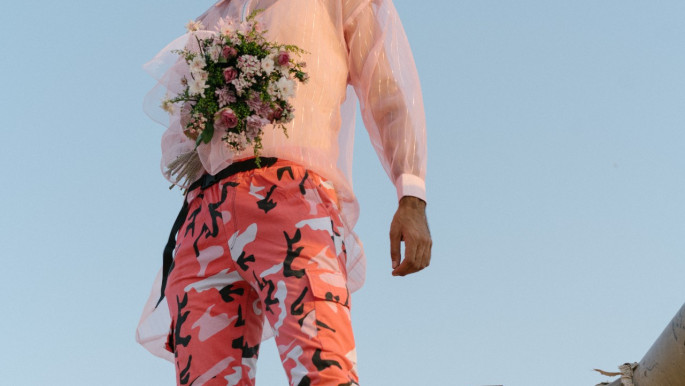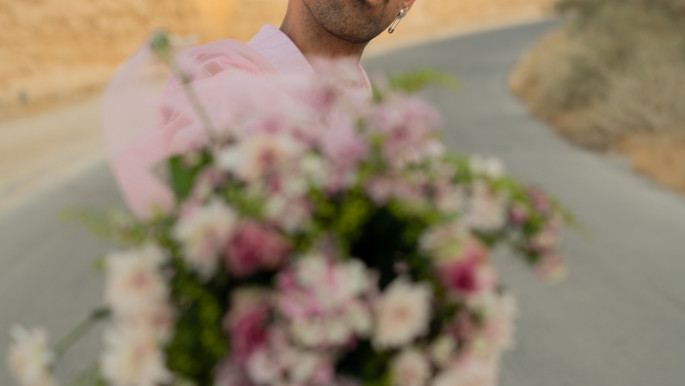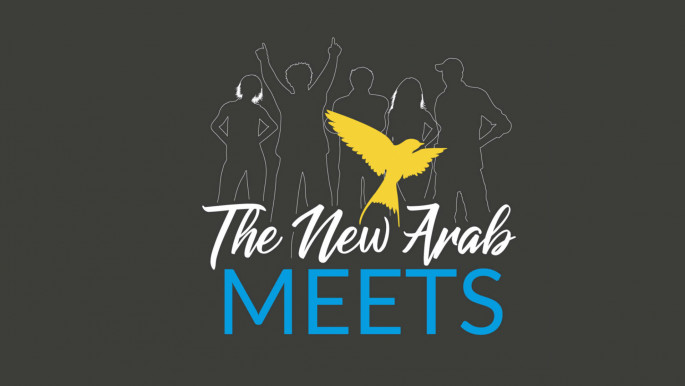Queer life, occupation and expectations: How Palestinian-singer Bashar Murad challenges conservative norms with music
The track's title is Arabic for nonsense, mockery, or bullsh*t. And while it was officially released last December and marks the first single of his upcoming EP of the same name, the Palestinian singer and songwriter had previously performed Maskhara during live performances.
"I wrote it that long ago and I performed it a lot on stage without releasing it, but I was always worried it would stop being relevant," Bashar reflects.
"But as time progressed, it became even more relevant, especially in 2020 – the epitome of mockery with everything that was going on in the world.
"I just felt like it was getting delayed for a reason, so that it could be released in December, at the end of the absurd year."
On the surface, Maskhara is a pure Arabic pop song, complete with a Caribbean beat. But according to Bashar, it's about mental health, a cry for help, and escapism from the conservative aspects of society. It's also about hope, twinned with the disillusionment Palestinians have with current leaders – both their own and Israeli.
 |
It's about mental health, a cry for help, and escapism from the conservative aspects of society. It's also about hope, twinned with the disillusionment Palestinians have with current leaders – both their own and Israeli |  |
"I noticed that everyone around me, including myself, was looking for an escape from all these things," the 28-year-old explains.
"There are different ways that people try to escape. Some by dancing, some by reading, some by doing sports, some by smoking, some by doing drugs, or partying, etc.
"I wanted to highlight how ridiculous this situation has become here, how much of a mockery it has become. It's pushing people who are very smart, have a lot of potential and have a lot to give to the world, into vices or other things to cope."
 |
|
| The video clip for Maskhara was directed by Bashar himself [Fadi Dahabreh] |
The video clip for Maskhara, directed by Bashar himself, is full of visual metaphors. The separation wall not only represents regional divisions and the Israeli occupation, but the way they fall represents a desire to break free from the walls society itself places around people.
There are even watermelons, which, when sliced and kept on the rind, represents the colours of the Palestinian flag and is historically a symbol of protest.
|
Meanwhile, the coffee cup reading is a metaphor of family expectations, and the pink outfits, the pink lighting and filters, and pink roses stuffed into a military tank are a nod to pinkwashing – the promotion of the queer-friendliness of a political entity to distract from human rights abuses.
As a gay Palestinian himself, the latter hits close to home. In 2019, Bashar attracted global headlines through his involvement in Globalvision, an alternative concert that was livestreamed simultaneously with Eurovision in Tel Aviv – which had been plagued with pinkwashing controversy.
"We didn't get the same number of viewers as Eurovision, but it still felt like we were doing something important," Bashar recalls.
"Eurovision is a very queer event. It's also a musical event, so it was not just pinkwashing, it was also artwashing. As a gay artist, it was so important for me to make a statement.
"They were also emphasising the fact that Eurovision is not political when it's the epitome of politics. It's different countries voting for and against each other and flags being waved everywhere.
"But when it comes to Palestine and our voices, we were shut down. We were told that no, this is not a political event, this is a party and this is a happy event."
Being political is nothing new for Bashar. If anything, it runs in the family – as does music. Born and raised in East Jerusalem, he is the son of Said Murad, the founder of Sabreen, a pioneering alternative Palestinian musical group who enjoyed success in the 1980s and 1990s.
Said is still active through the Sabreen Association for Artistic Development, and Bashar credits him as being the biggest supporter in his career.
 |
From a very young age, I always had this vision that I wanted to pursue music. I discovered how it can be a tool to express yourself and present new ideas, and as therapy to get through your problems |  |
"Sabreen were known for mixing traditional and folk music with influences of jazz and a little bit of rock and blues," Bashar says.
"The lyrics they chose were mostly from Palestinian poets and my dad would compose the music to the poetry. It was a revolutionary and alternative sound that resonated with a lot of university students and younger people.
"Maybe the topics that we talk about are a little different, and the sound is different, but I think there's a lot of parallels to our music.
"So from a very young age, I always had this vision that I wanted to pursue music. I discovered how it can be a tool to express yourself and present new ideas, and as therapy to get through your problems."
Although he initially performed covers of popular songs on his YouTube channel, Bashar only started to pursue original music after he completed university in the US and returned home in 2014.
Boosted by access to Sabreen's recording studios, he initially received grants or other support, such as the Culture Resource Production Awards Programme that enabled him to record Shillet Hamal (Bunch of Bums), or the UN for his single Ana Zalameh (I'm A Man).
 |
|
| Bashar's works are a track record of challenging societal norms [Fadi Dahabreh] |
Whether he's singing about queer issues or life under occupation, Bashar's works are a track record of challenging societal norms. For instance, the video for More Like You features a hijabi boxer, a male ballet dancer breaking out of his box, and a female race car driver, DJ, and mechanic.
Meanwhile, Ilkul 3am Bitjawaz (Everyone's Getting Married) is a riff on traditional Arab marriage that challenges gender roles and expectations.
Amidst the media frenzy around Eurovision in 2019, one positive and lasting outcome was the friendship Bashar forged with Hatari, the Icelandic techno-punk band who unfurled a Palestine scarf on camera when their results were announced. They were first in contact months before Eurovision even took place and met a month or so before. During this time, Bashar took them to Hebron and introduced them to artists in Jerusalem, Ramallah and Bethlehem.
They also recorded Klefi/Samed – which was released shortly after Eurovision finished up in Tel Aviv. Filmed in Jericho, the accompanying video clip features striking visuals of Bashar carrying the Palestinian flag, along with the symbolism of the key. It helped him reach a wider audience, and he has since performed with Hatari in Iceland three times. The exposure also helped Bashar secure a recording contract with PopArabia.
"We were both getting a lot of pressure. [Hatari] were getting pressure not to perform in Tel Aviv. And I was getting pressure not to collaborate, not to talk to them," he recalls.
"We went through a lot together, but I'm glad we stuck it out."
|
|
While Bashar refuses to be essentialised as a Palestinian artist – let alone a gay artist – he acknowledged he has a platform that could be used for good. He also said his identity infused itself in his music and image, regardless. For this reason, he feels obligated to ensure his representation is done authentically.
"I am Palestinian, and no matter what I do, even if I'm not singing about being Palestinian, the fact that I am Palestinian, just makes it Palestinian," he says.
"I've suffered being Palestinian living in under occupation, but I know so many others have suffered even more than I have, so I feel I do owe Palestine and my people. I'm not trying to succeed and then run away and forget where I come from.
 |
I struggled because I'm Palestinian and then I struggled because I'm gay. But now it sort of feels like this powerful thing. I have these tools that I've been blessed with. They caused suffering growing up, but now I can really own them and tell my story, my way |  |
"Growing up, I struggled because I'm Palestinian and then I struggled because I'm gay. But now it sort of feels like this powerful thing. I have these tools that I've been blessed with. They caused suffering growing up, but now I can really own them and tell my story, my way.
"It's so important, because there is barely any queer representation, especially in the Middle East. Even so, I don't always want to be labelled as a queer artist or gay Palestinian, because at the end of the day, I'm human.
"But I realise these labels are important because they highlight visibility. They show that Palestinians are not a monolith. We're diverse. So I feel like I have this responsibility to show that."
Listen to Bashar Murad on Spotify. His EP Maskhara is due for release in summer through PopArabia.
Elias Jahshan is a Palestinian/Lebanese-Australian journalist and freelance writer based in London.
Follow him on Twitter: @Elias_Jahshan
Read more from The New Arab Meets special section below:
 |





 Follow the Middle East's top stories in English at The New Arab on Google News
Follow the Middle East's top stories in English at The New Arab on Google News


